Thailand’s King Bhumibol Adulyadej was the superlative monarch. He was the world’s longest-reigning, the world’s richest and, among his own subjects at least, the world’s most adored. Throughout his 70 years on the throne, Bhumibol has been credited with staving off numerous catastrophes through intelligence, fortitude and his love of country. Yet in the decade approaching his death on Thursday at the age of 88, his kingdom, Thailand, has been increasingly wracked by bitter political schisms.
Bhumibol’s body will rest in Bangkok’s spired Grand Palace in a golden urn, draped in silk, gold and diamonds, for an official grieving period of one year, as Brahmin priests and Buddhist monks, wreathed in incense smoke, chant incantations.
The palace announced that the King died “peacefully” at 3:53 p.m. local time. “Even though the board of doctors has closely monitored and treated him to the best of its abilities, the King’s condition never improved but deteriorated until Thursday,” the palace said.
Junta leader Prayuth Chan-ocha announced that Crown Prince Maha Vajiralongkorn would be the new monarch in accordance with the constitution, the Associated Press reports. “He was a King that was loved and adored by all. The reign of the king has ended and his kindness cannot be found anywhere else,” Prayuth said.
Bhumibol’s impending death was a source of deep anxiety in Thailand. Very few Thais are old enough to have known another King, presenting a challenge for his only son and named heir, Vajiralongkorn. A former military air-force pilot trained in the U.S., U.K and Australia, the 63-year-old has struggled to win the same respect as his father, primarily the result of stories of a lavish and eccentric lifestyle. Many wondered whether one of the three princesses would ascend the throne instead.
Wrangling over the sensitive subject of succession, and thus control of the royal fortune, is what many observers attribute the nation’s latest military coup d’état of May 22, 2014. The instability wrought by the coup and martial law has had a dire effect: the Thai economy is flatlining and Bangkok has been shaken by terrorist attacks and elections have been repeatedly pushed back by the ruling junta.
This also presents a challenge for U.S. foreign policy, especially the Obama Administration’s “rebalancing” to Asia. Without strong regional partners — Thailand is America’s oldest ally in Asia — maintaining support for regional strategic goals will be tough, throwing into doubt the broader geopolitical objective of being a counterweight to China. Faced with international censure for human-rights abuses, the junta has been moving closer to Beijing, repatriating persons of interest to China without little regard to international condemnation. With the issue of succession resolved, Washington will hope that democracy can be restored and a crucial relationship repaired.
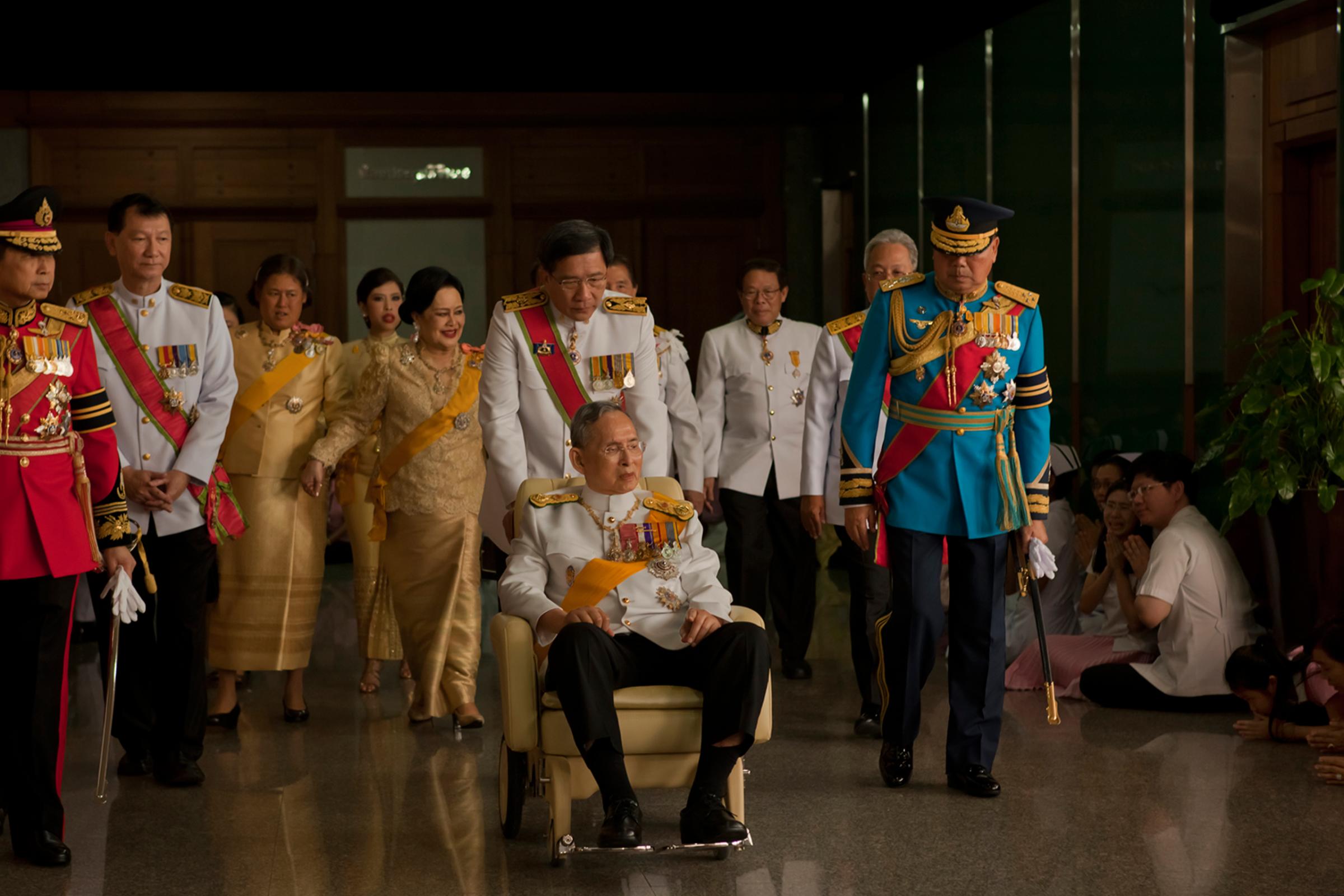
The late King himself had a strong personal connection to the U.S. The muggy monsoonal heat of Bangkok where Bhumibol passed was a world apart from his birth on a frosty morning at Mount Auburn Hospital in Cambridge, Mass. The only monarch ever born on American soil arrived on Dec. 5, 1927, during a turbulent period in the Kingdom of Siam, as Thailand was then known, where myriad parties were plotting to end the absolute rule of the crown. Whether this would take the form of a constitutional monarchy, as eventually came to the fore in Britain, or an outright republic, as bloodily forged in Russia and France, was anyone’s guess. And so Bhumibol and his elder brother Ananda, who was heir to the throne of their uncle, King Prajadhipok, were first ensconced in the U.S. and later to the safety of Lausanne, a city perched on the shores of Lake Geneva in the Swiss Alps. There they grew up under the care of their formidable commoner mother, Srinagarindra née Sangwal Talapat, following the premature death of their father, Prince Mahidol Adulyadej, who was a pioneering doctor as well as Prajadhipok’s brother.
Ananda and Bhumibol’s formative years were spent speaking French and attending Champ Soleil boarding school, and later the progressive École Nouvelle de la Suisse Romande. Bhumibol was a diligent student, according to Sangwal, who wrote that the young prince “understands the importance of studies.” This Western-style upbringing, joshing with friends and surrounded by a smattering of servants, who did not prostrate themselves, was utterly alien from their celestial heritage, and thus a source of consternation back in Bangkok. There was neither a Buddhist temple nor a single saffron-robed monk in Lausanne, and aside from a few amulets and statues at home, the princes grew up immersed in the trapping of continental Christianity. “They hiked in the mountains and skied the snow-covered peaks while most Thai kids frolicked in steamy rice paddies with water buffaloes,” writes journalist Paul Handley in The King Never Smiles, his controversial 2006 biography of Bhumibol that remains banned in Thailand. By the end of World War II, adds Handley, “both were better suited for the life of well-heeled bon vivants in Europe than golden-robed, sacral princes in an impoverished tropical Asian state.”
Unencumbered by kingly burden, Bhumibol was by all accounts a joyful and healthy child, though the same was not true of his brother, the crown prince. Following his uncle’s abdication in March 1935, Ananda was proclaimed monarch, but was so sickly that he would not set foot in his realm until 1938 at the age of 13. The crown’s last vestiges of real power had been stripped away following a coup d’état in 1932, but the feuding elite factions that controlled Thailand were content to have a weak king on the throne to provide the facade of legitimacy.
Life in Pictures: King Bhumibol Adulyadej of Thailand
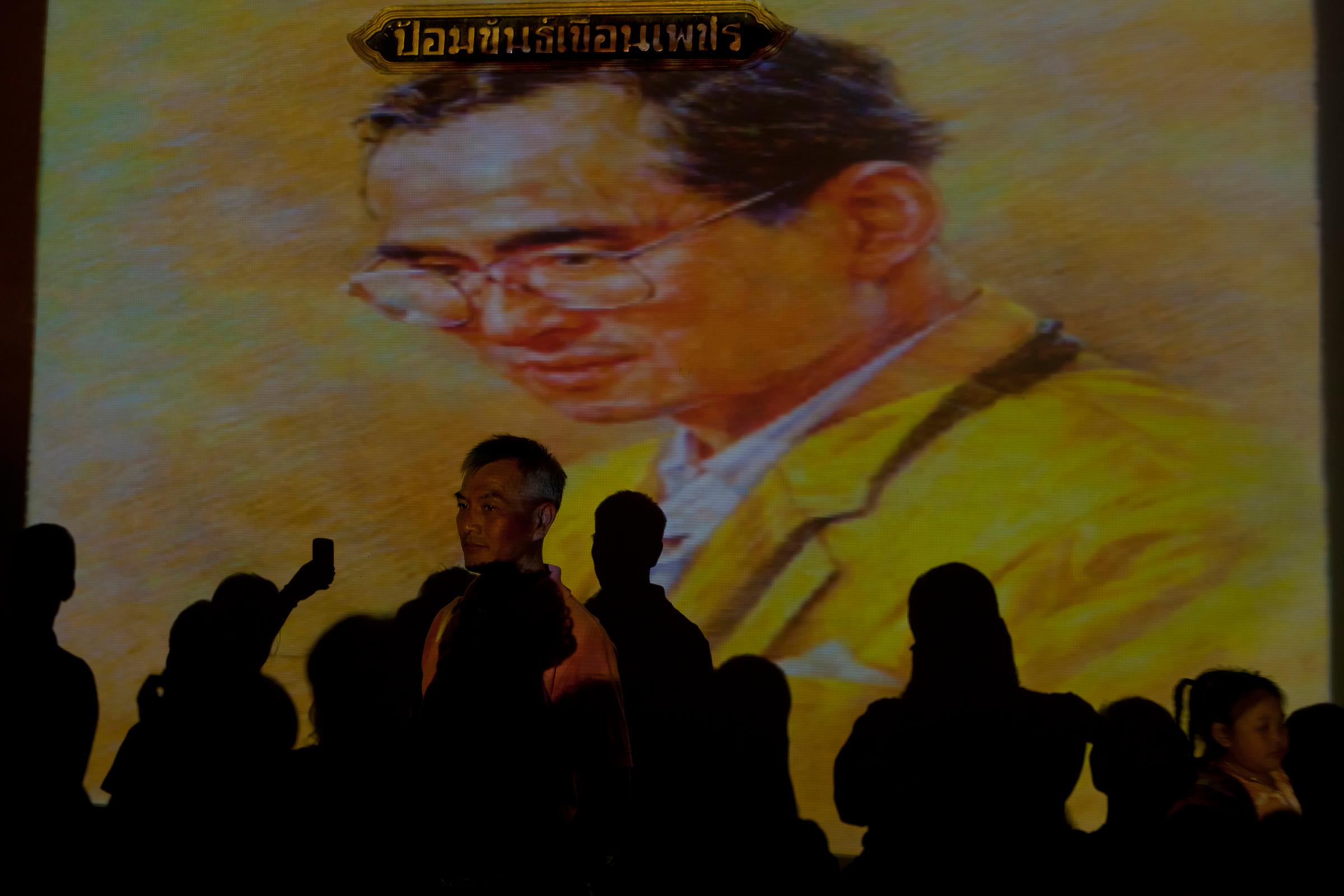

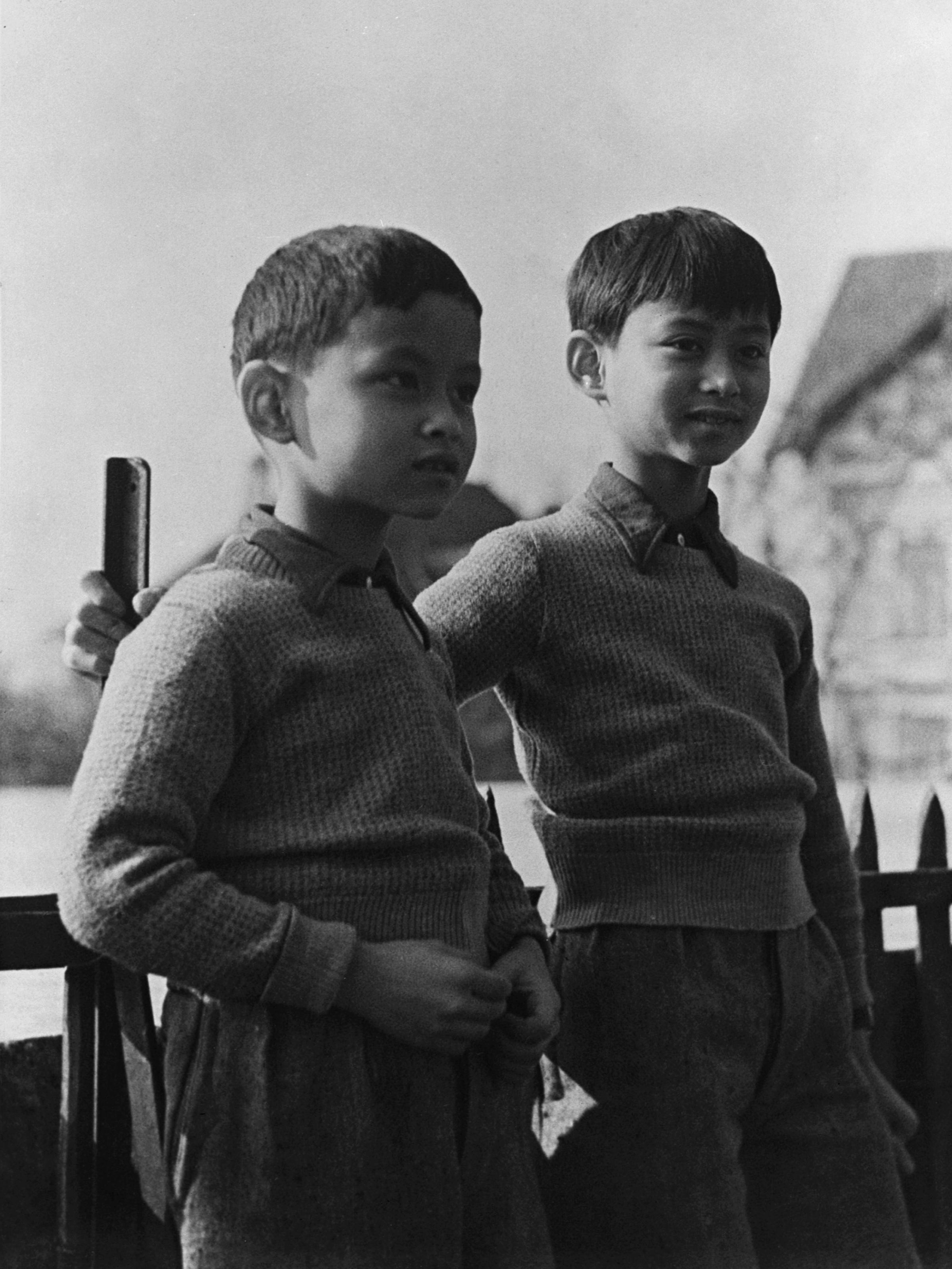
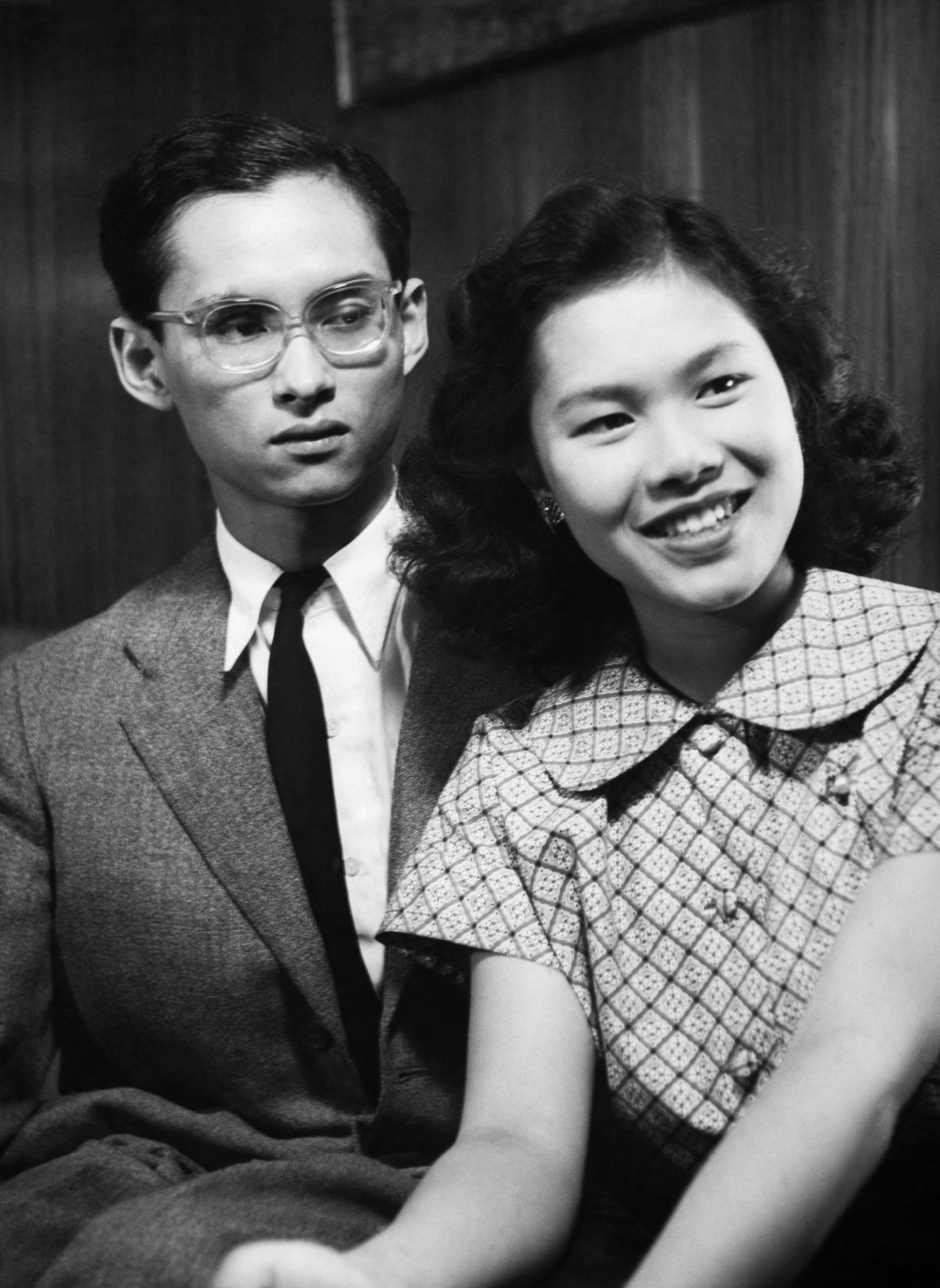
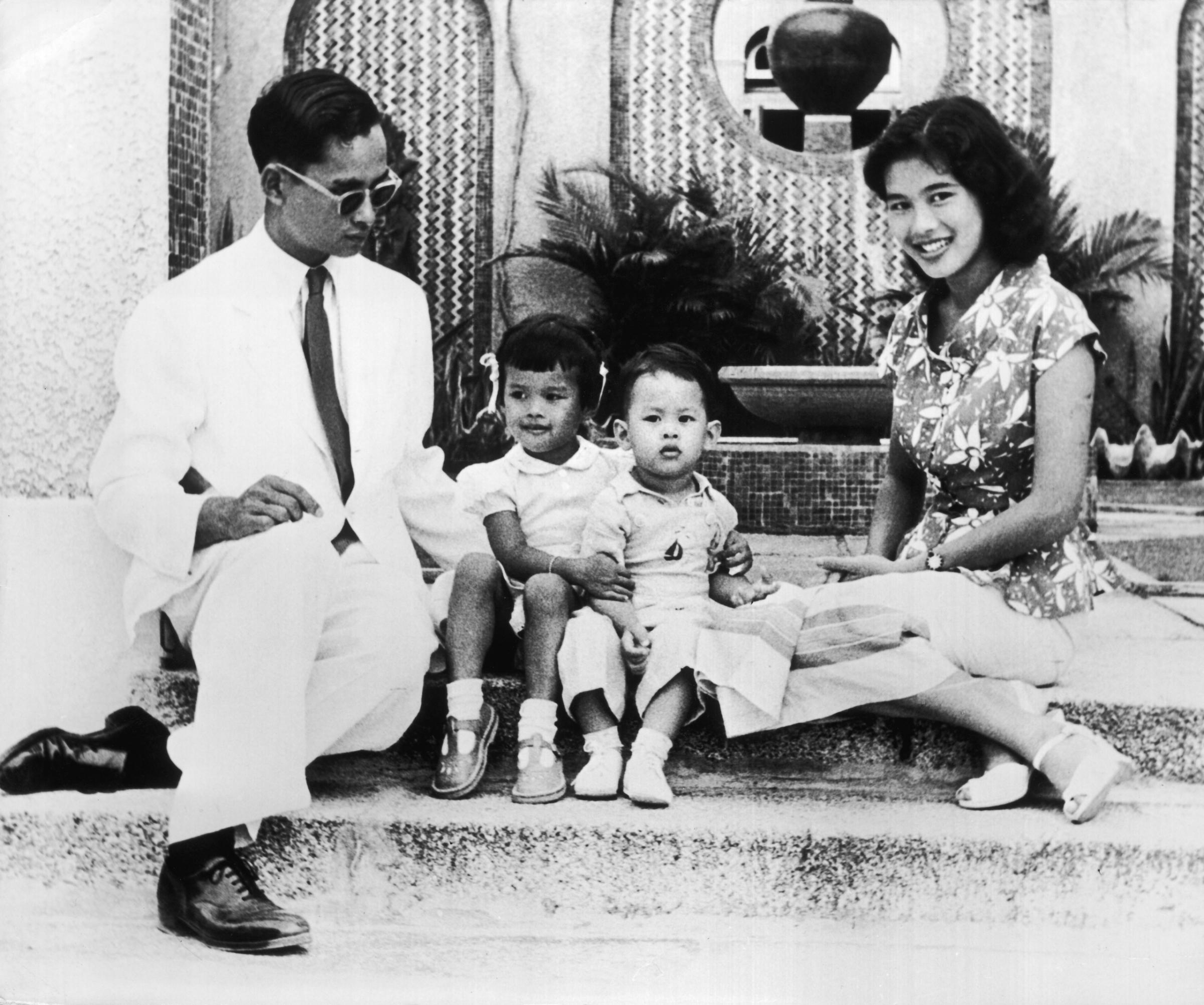
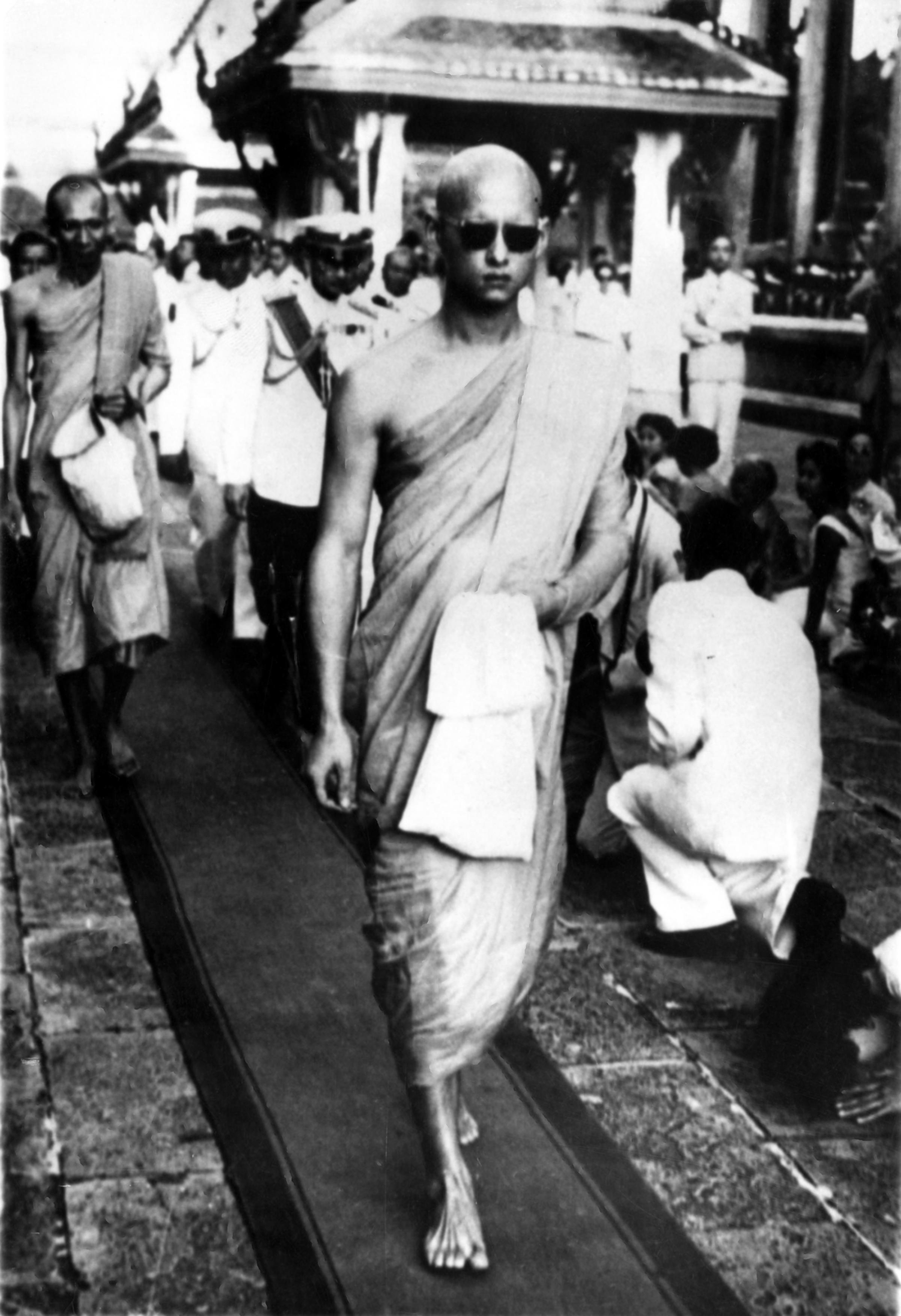
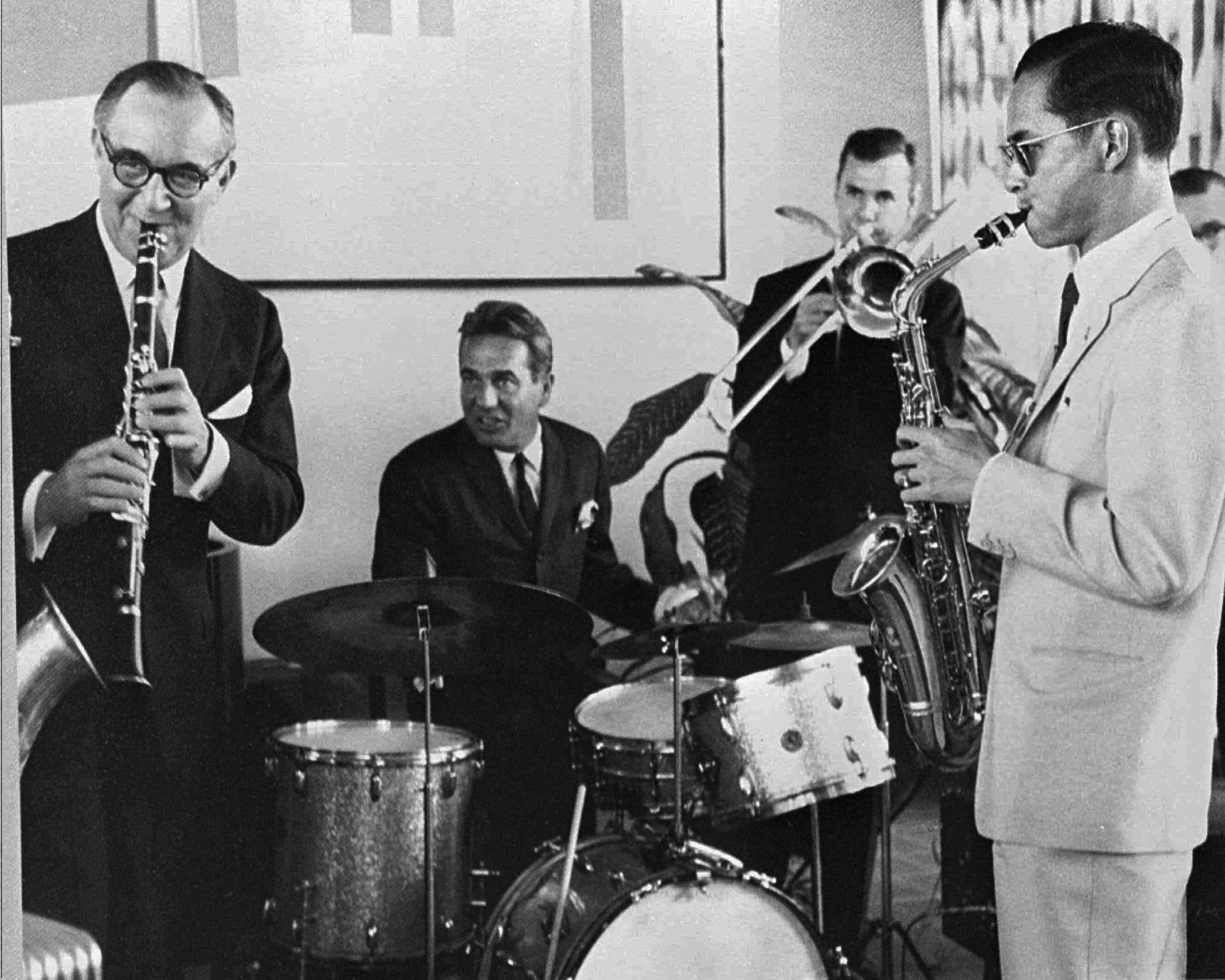
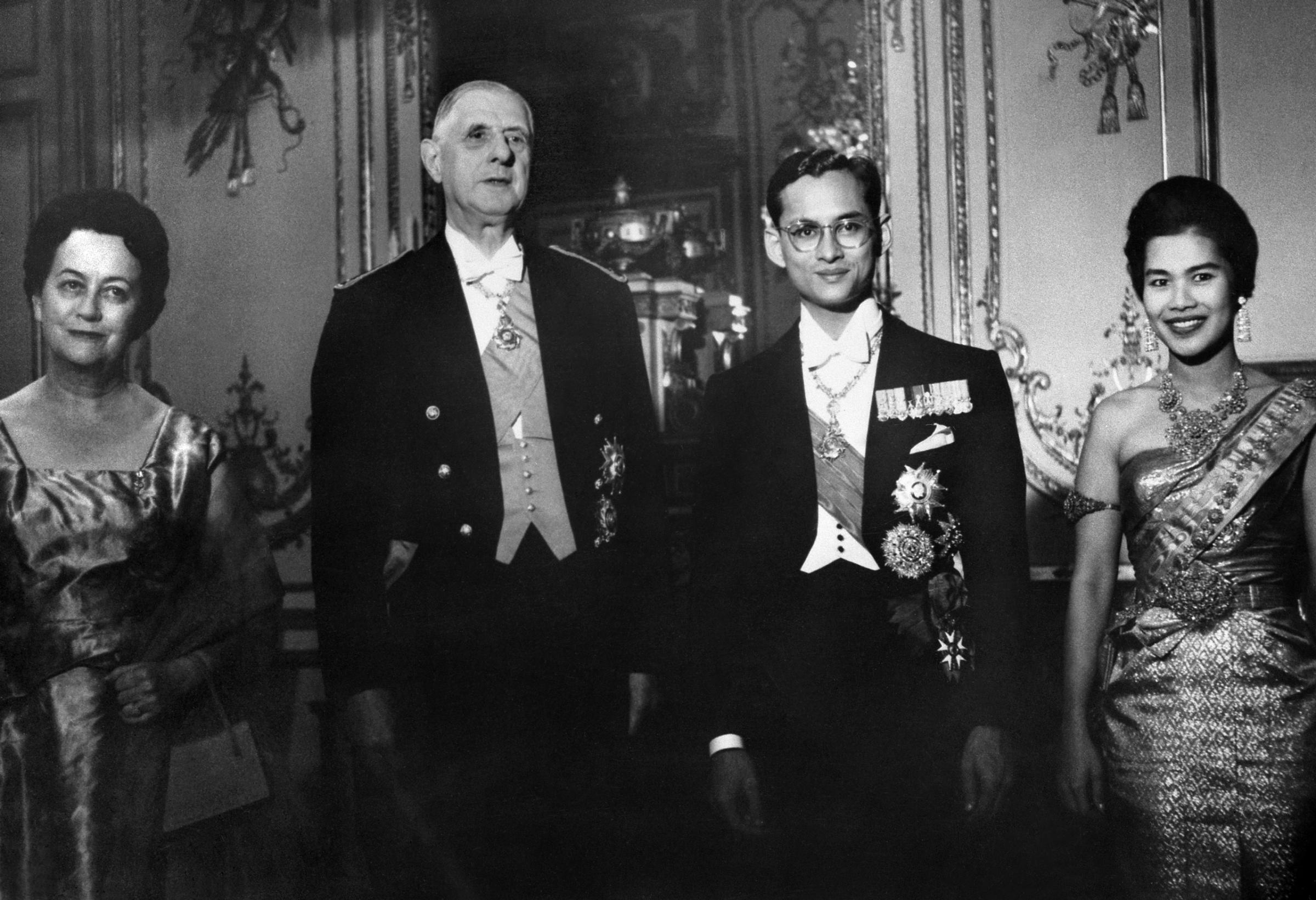
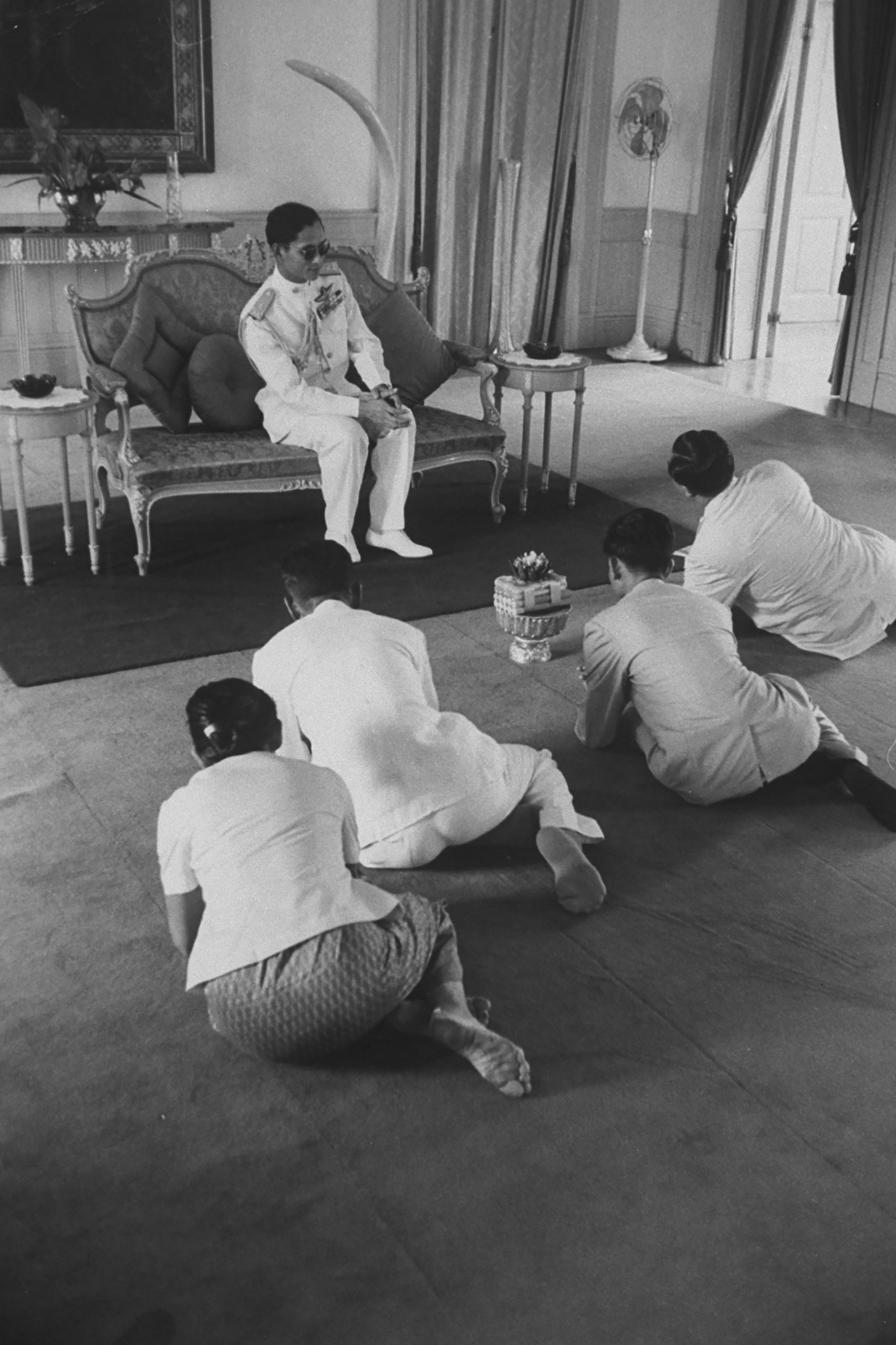
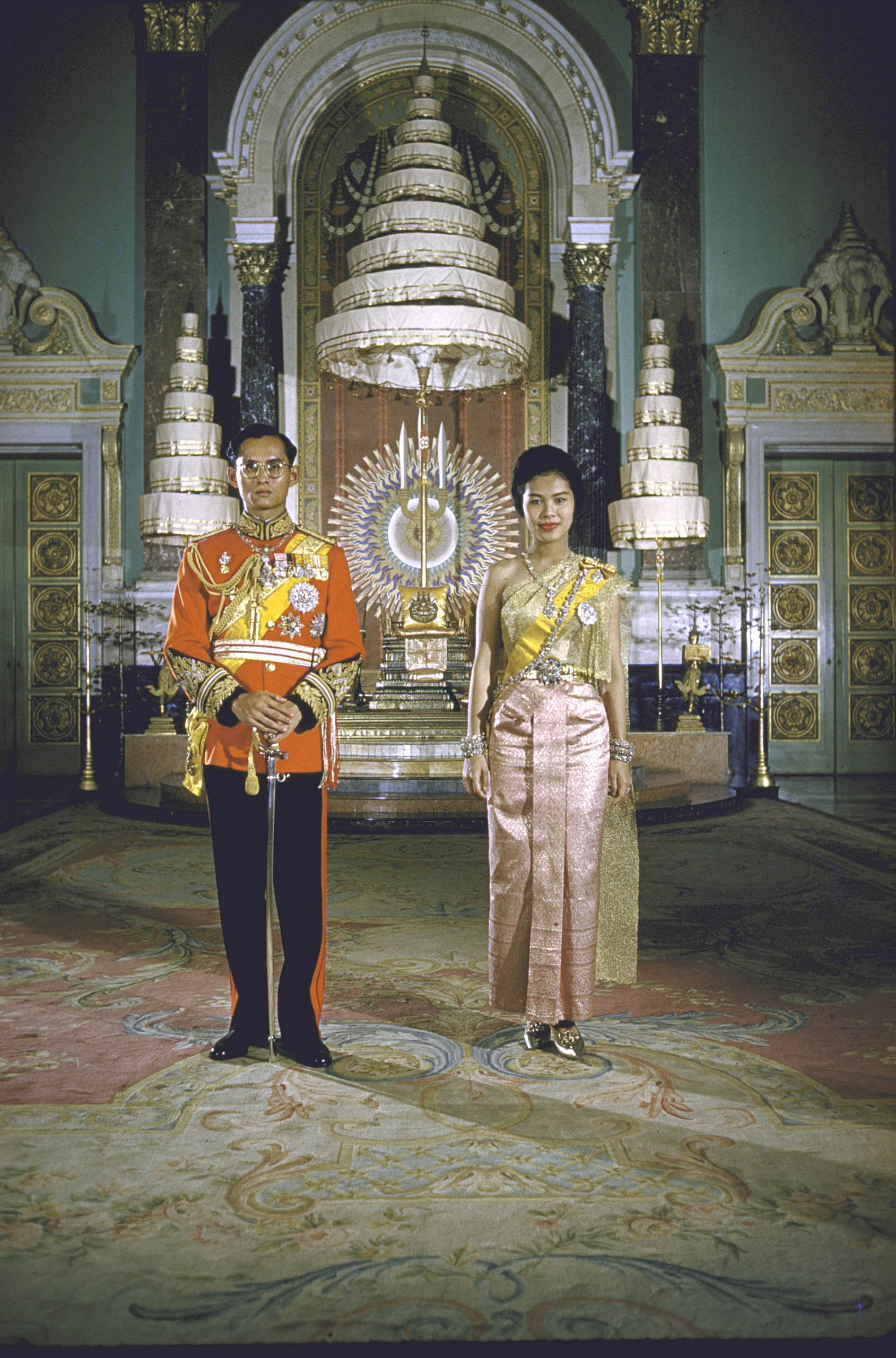
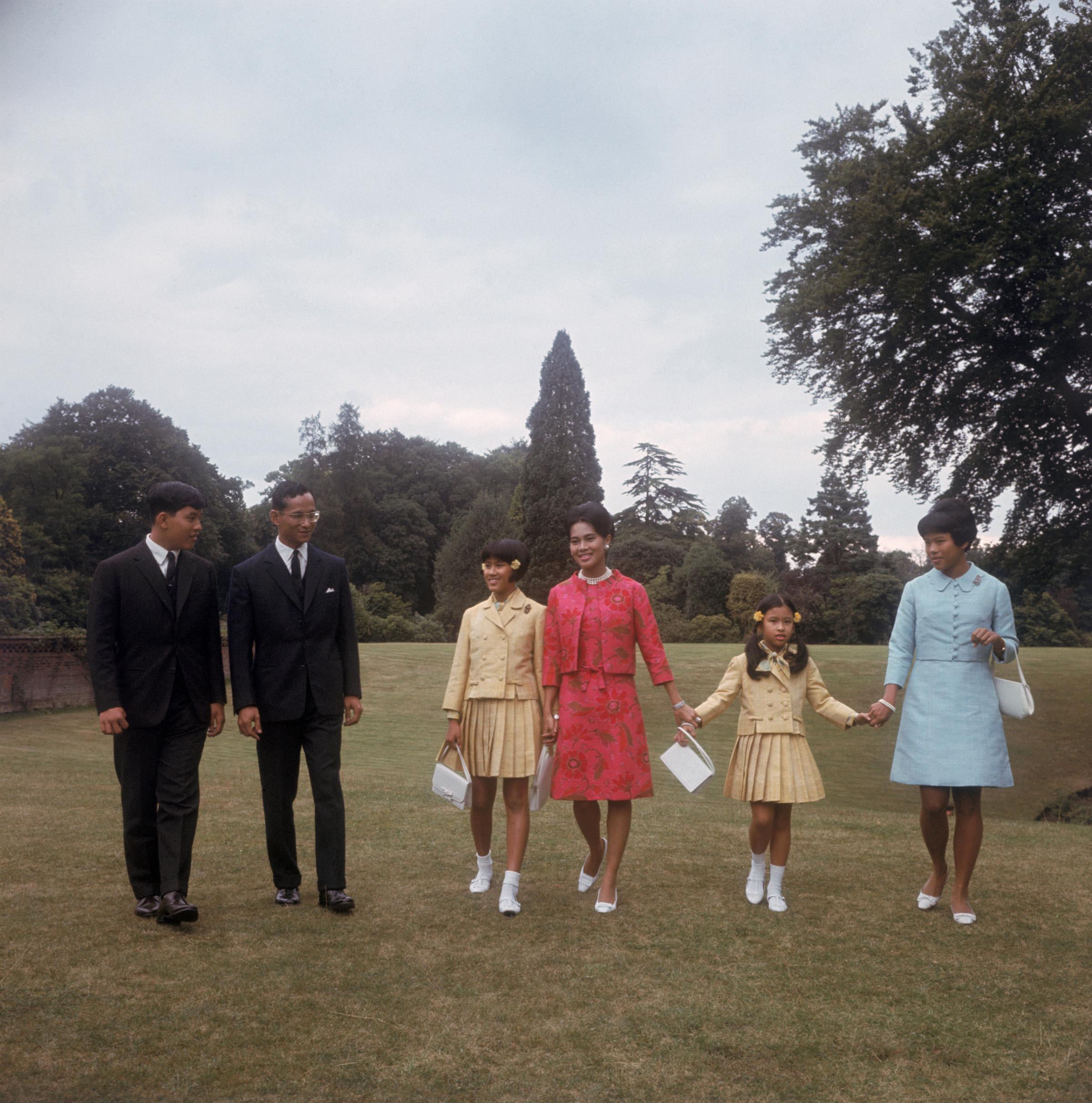
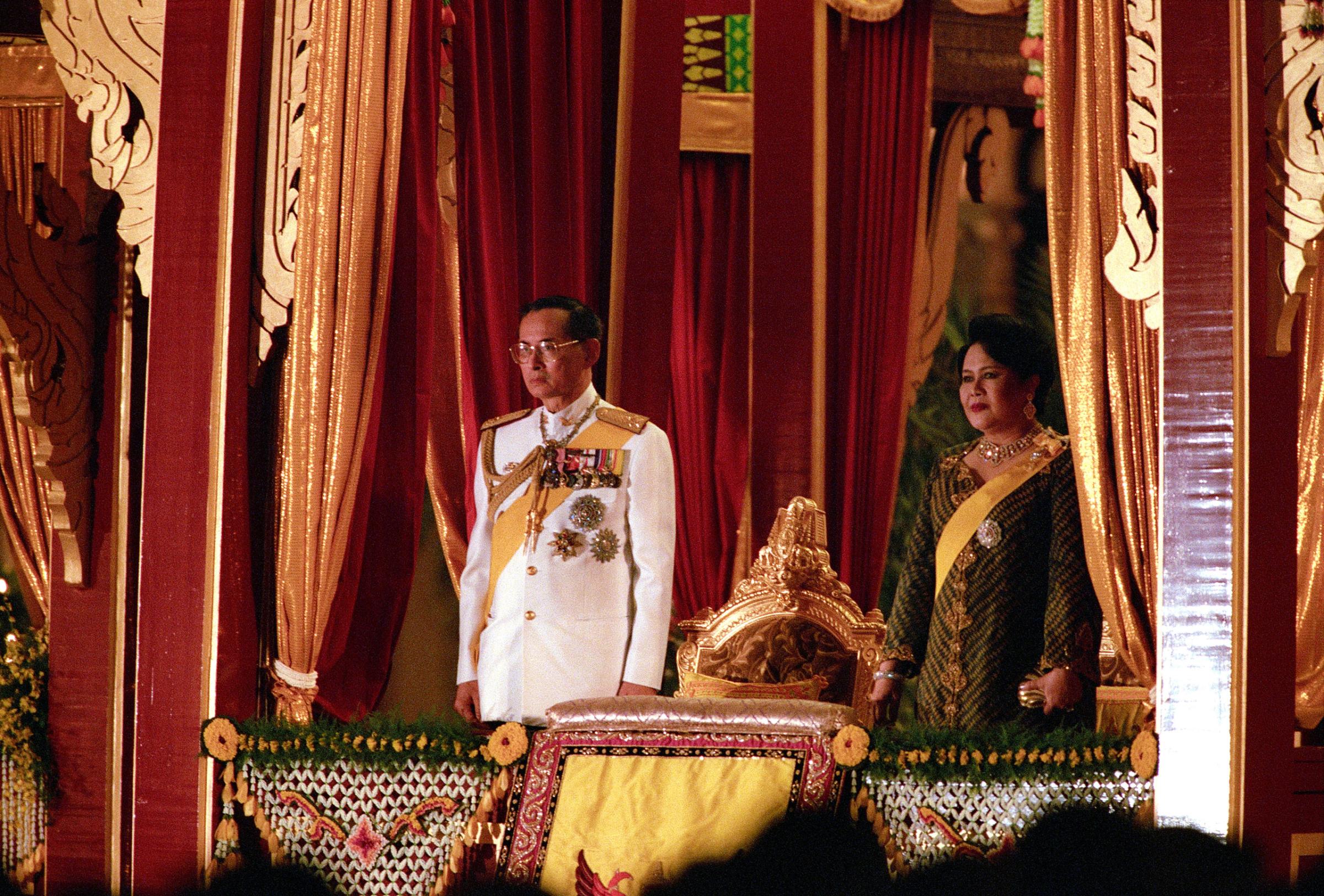
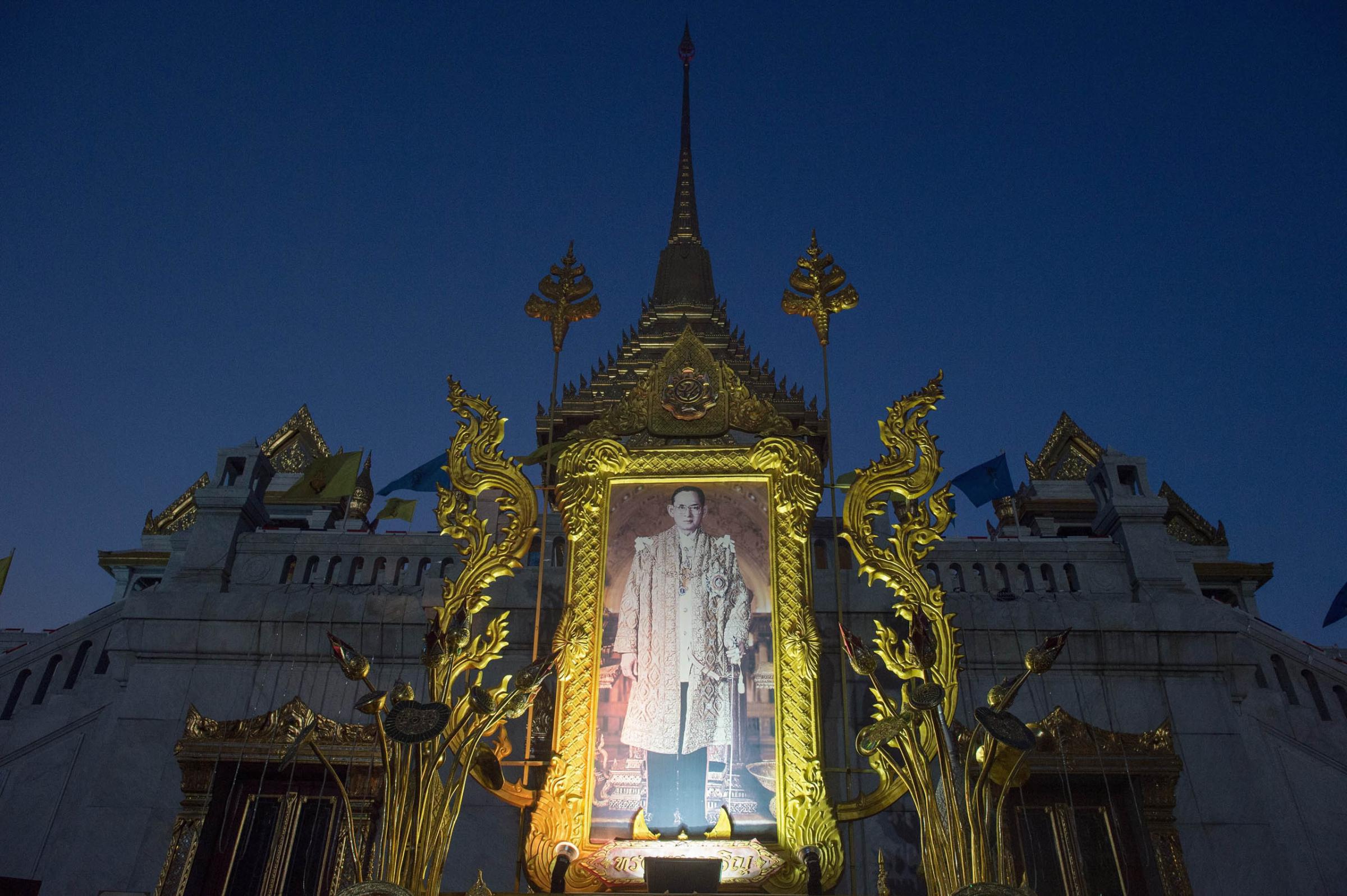
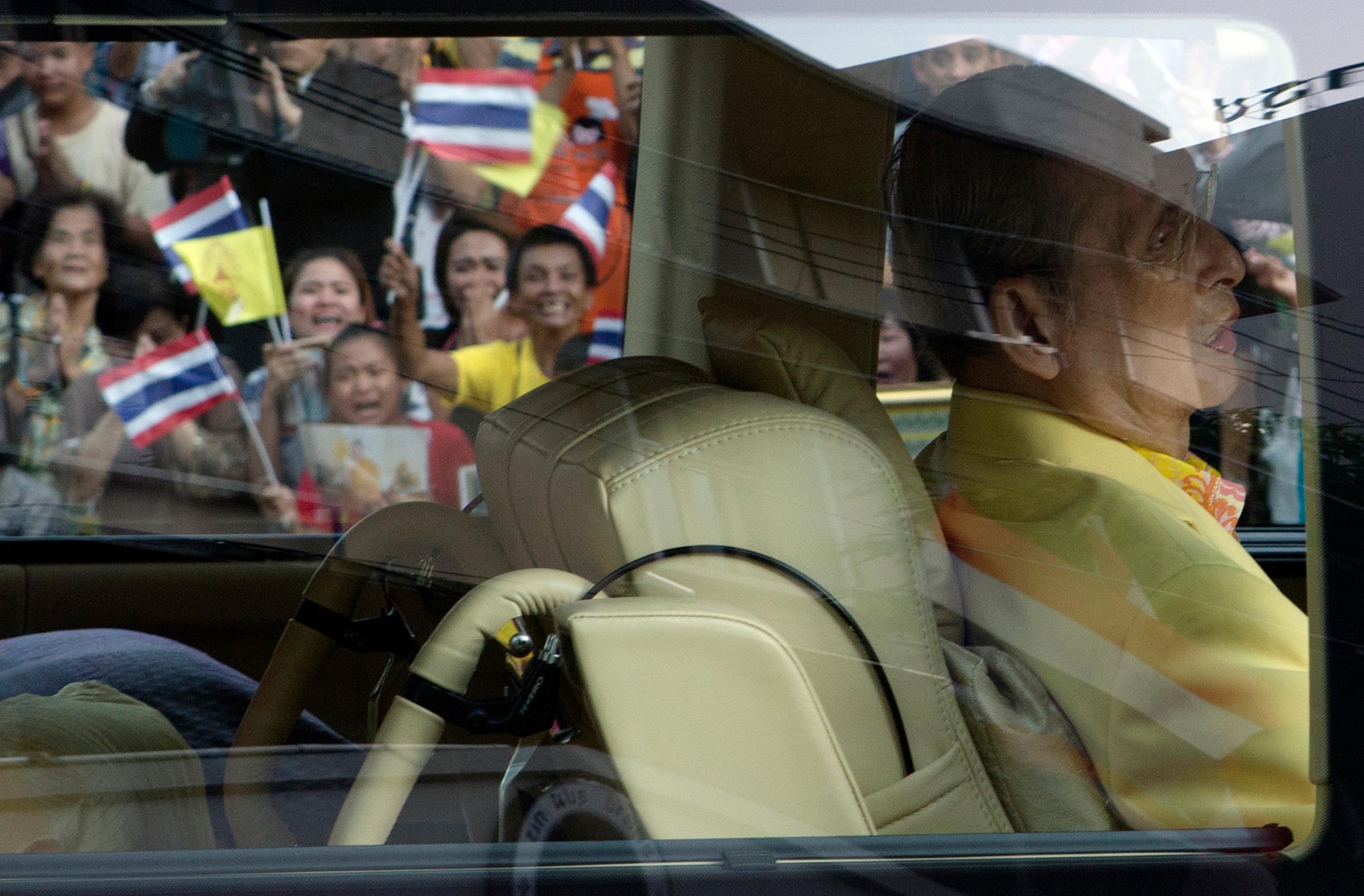
However, on June 9, 1946, just days before the family’s scheduled return to Europe, Ananda was found dead in his bed in Boromphiman Throne Hall at Bangkok’s Grand Place. Age 20, he had been shot through the head with a Colt 45, a gift from a former U.S. Army officer, which he kept by his bedside. Bhumibol was proclaimed King Rama IX of Siam’s Chakri dynasty that same day, though he would not be crowned until 1950, after the official name change to Thailand, meaning, Land of the Free. He spent the interim period back in Switzerland, ostensibly to finish his studies (he never did graduate), but by some accounts hopelessly disconsolate. Speaking to BBC reporter David Lomax in 1980, casually lounging on the floor of his study, Bhumibol looked pained as he recalled his brother’s demise: “When I arrived he was already dead. Many people wanted to advance, not theories but facts, to clear up the affair. They were suppressed and they were suppressed by influential people in this country or international politics.”
A trio of palace courtiers were sentenced to death for regicide, even though few believed them responsible, and many suspected that Ananda had died by suicide or through an accident. Notwithstanding his professed suspicions of subterfuge, Bhumibol failed to stop the executions of the three supposed King slayers, despite being the only figure capable of issuing a pardon.
The crown Bhumibol inherited was essentially the same vessel Ananda had worn, though several factors conspired to allow the young King to build arguably the most politically active constitutional monarchy of the 20th century. First, arch royalist General Sarit Thanarat seized power in a September 1957 coup, to which Bhumibol gave his blessing. A notorious womanizer and lush, Sarit in return cemented the link between the military and the monarchy, placing Bhumibol at society’s zenith. “From that point on he’s been the preeminent figure in Thailand,” says Charles Keyes, professor emeritus of anthropology and international studies at the University of Washington.
Read More: See Portraits of Thailand’s King Bhumibol Adulyadej Displayed All Over Bangkok
Domestic efforts dovetailed with external factors — chiefly the Vietnam War and strong support from Washington for this U.S.-born, Western-educated, statesman-like, modern monarch. The young King played saxophone with jazz legends like Duke Ellington, won prizes for sailing, was a keen amateur photographer and painted expressionist oils. Frequenting cocktail parties with his beautiful and enchanting Queen Sirikit Kitiyakara, the gangly, bespectacled Bhumibol appeared to the American chattering classes as a righteous ally and regional bulwark amid the existential struggle with communism.
This seismic shift in U.S. attitudes is demonstrated by contrasting two TIME covers. In 1950, when Bhumibol returned from Europe for his official coronation, the April 3 edition sported a caricature of the young King in full royal pomp with the headline: “In a Never-Never Land, Never Mind.” Sixteen years later, with Washington mired in the Vietnam War, TIME portrayed a steely Bhumibol in full military uniform with the caption: A Monarchy Fights for Freedom.
According to Paul Good, who worked for the U.S. Information Service in Thailand from 1963 to ’68, inculcating antipathy to communism was expressly achieved through imparting reverence for the monarchy. The theory was that “if the people were supportive of the King,” says Good, “that he would be the binding force, the focal point for all attention, and there wouldn’t be any susceptibility to the communist influence, which was coming in on the Laotian and Cambodian sides from Vietnam.”
Huge posters of Bhumibol, paid for by the U.S., were distributed across northern Thailand, where disenfranchised villagers were most vulnerable to communist ideals and infiltration. Archaic traditions of reverence, like prostration before the monarch, were reintroduced, and Buddhist temples and festivals were infused with royal imagery. The Thai media followed royal movements avidly, especially after the arrival of Princess Ubol Ratana in 1951 and Crown Prince Vajiralongkorn a year later. Princesses Sirindhorn and Chulabhorn were born in 1955 and 1957 respectively.
By 1958, Sarit had abrogated the constitution, halted elections and imposed even stricter limitations on free speech. But as he remained friendly with the U.S., and staunchly anticommunist, Washington was delighted to hitch its warhorse to his wagon, and Bhumibol’s exultation gathered pace.
Read More: Thais Are Praying for the Recovery of Ailing King Bhumibol Adulyadej
The royal family’s public-relations campaign had begun in earnest before Bhumibol’s return, as senior princes began distributing money and funding social-welfare projects, and Sarit allowed the palace room to swell its influence. Bhumibol and Sirikit spent much of their time touring villages and meeting pastoral Thais, typically illiterate with lips stained red from chewing betel, most of whom had had little contact with officialdom. The royal couple traveled with a small army of doctors and the ill or suffering would be brought out for treatment. Those who couldn’t be cured locally were transported to hospitals in the capital Bangkok.
In this way, Bhumibol fostered an image of royalty as distinct from government. Where politicians and bureaucrats failed in their duty, the King would strive to plug the gaps through his own munificence. In speeches, he would frequently chide politicians. And with his background in engineering, which he had studied at university, he busied himself with overseeing the construction of small dams and irrigation projects — water conservation was traditionally the purview of Thai monarchs — so saving the countryside’s poor from the extra hardships wrought by droughts. There have been well over 4,000 such development projects, and the sight of Bhumibol, armed with a notebook, two-way radio and camera, earnestly studying a map of some far-flung hamlet, became very much part of royal folklore. Some projects were more successful than others, and a few were disastrous, but there was no doubting the King’s sincerity nor diligence.
Following Sarit’s death in 1963, Thailand began to open politically as the government of Field Marshall Thanom Kittikachorn, another fiercely anticommunist strongman, rolled back restrictions on free speech. Student discussion groups began springing up at major universities that encouraged critical evaluation, often with a leftish slant. By 1973, this had developed into a cohesive political movement.
See Portraits of Thailand’s King Bhumibol Adulyadej Displayed All Over Bangkok
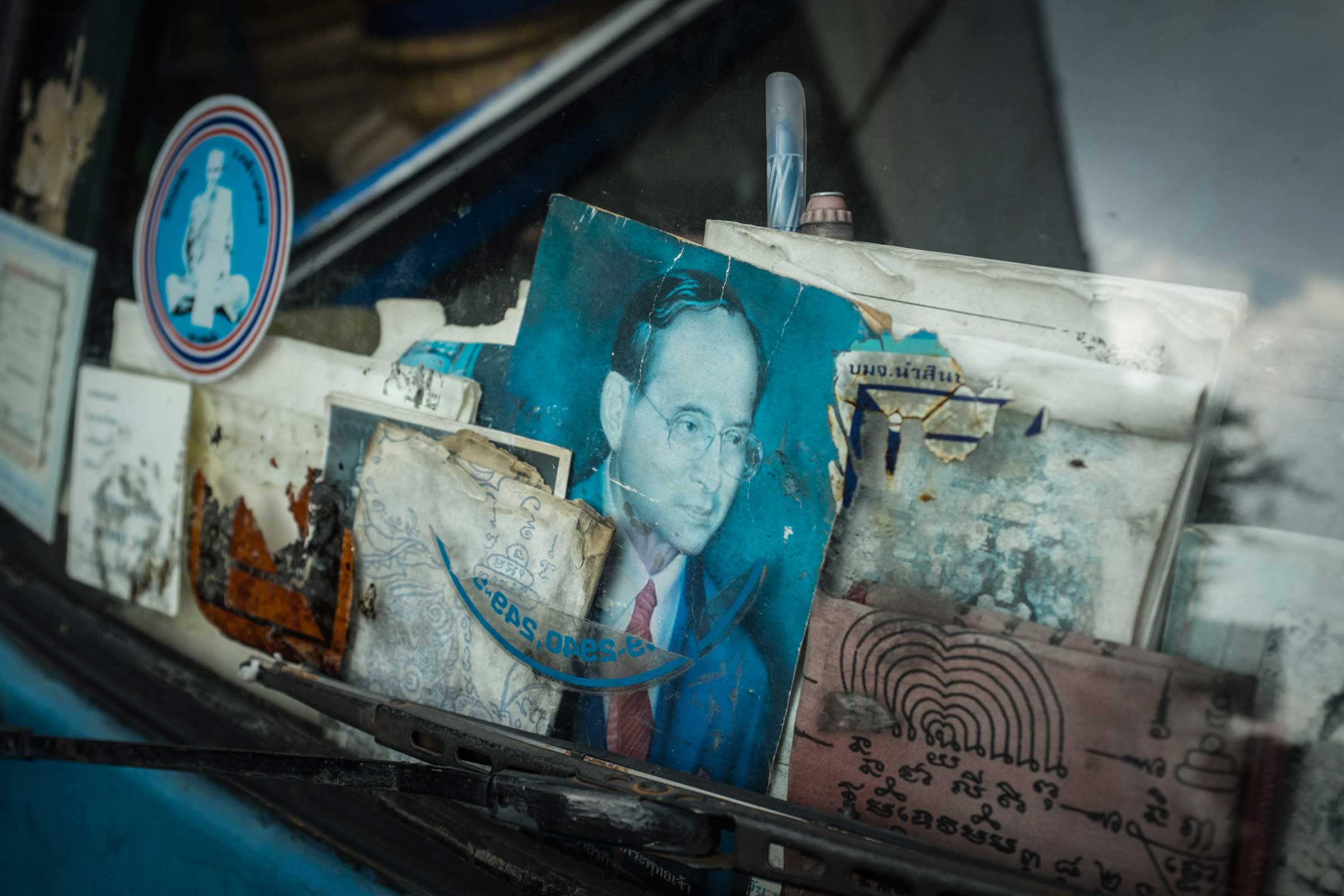
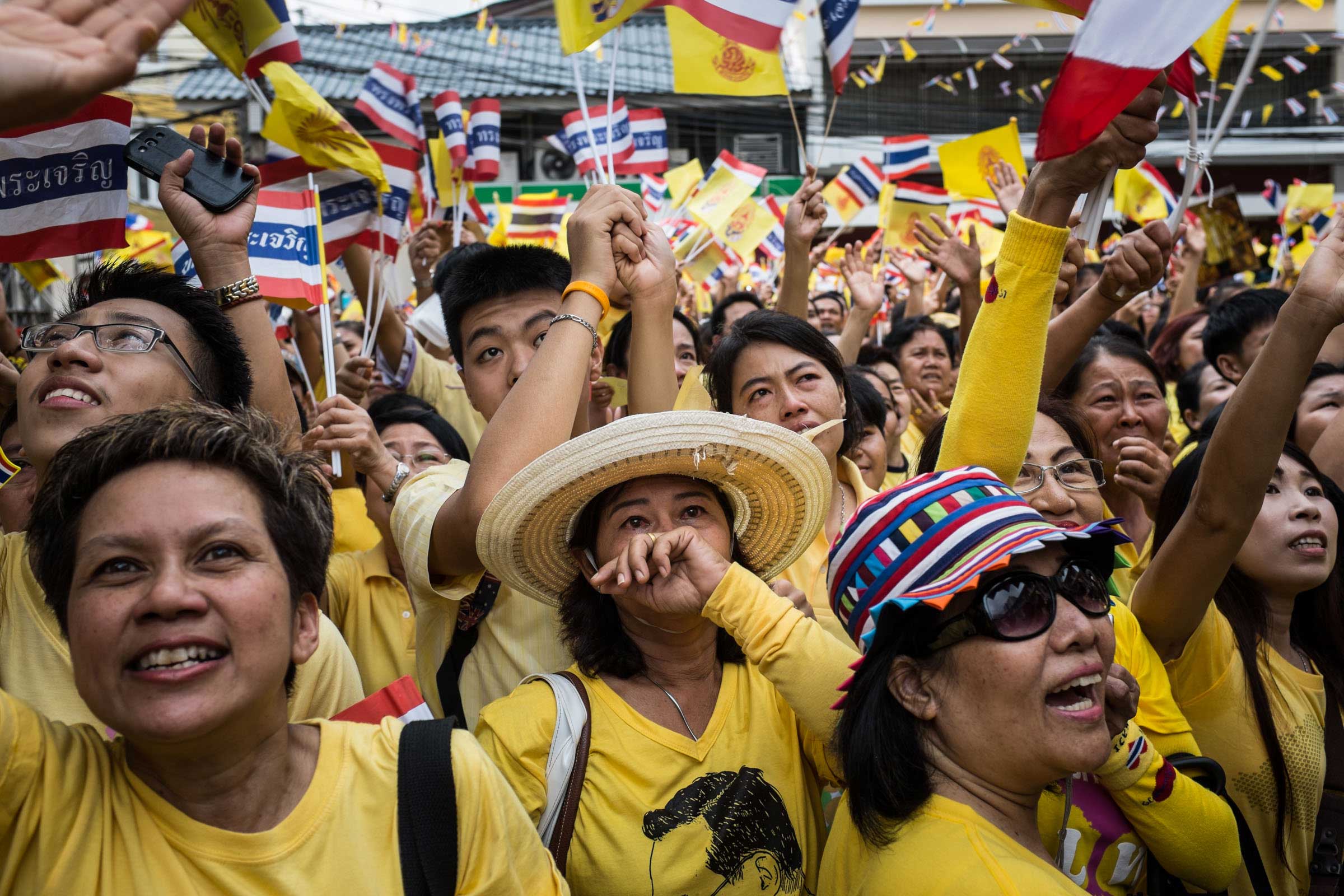
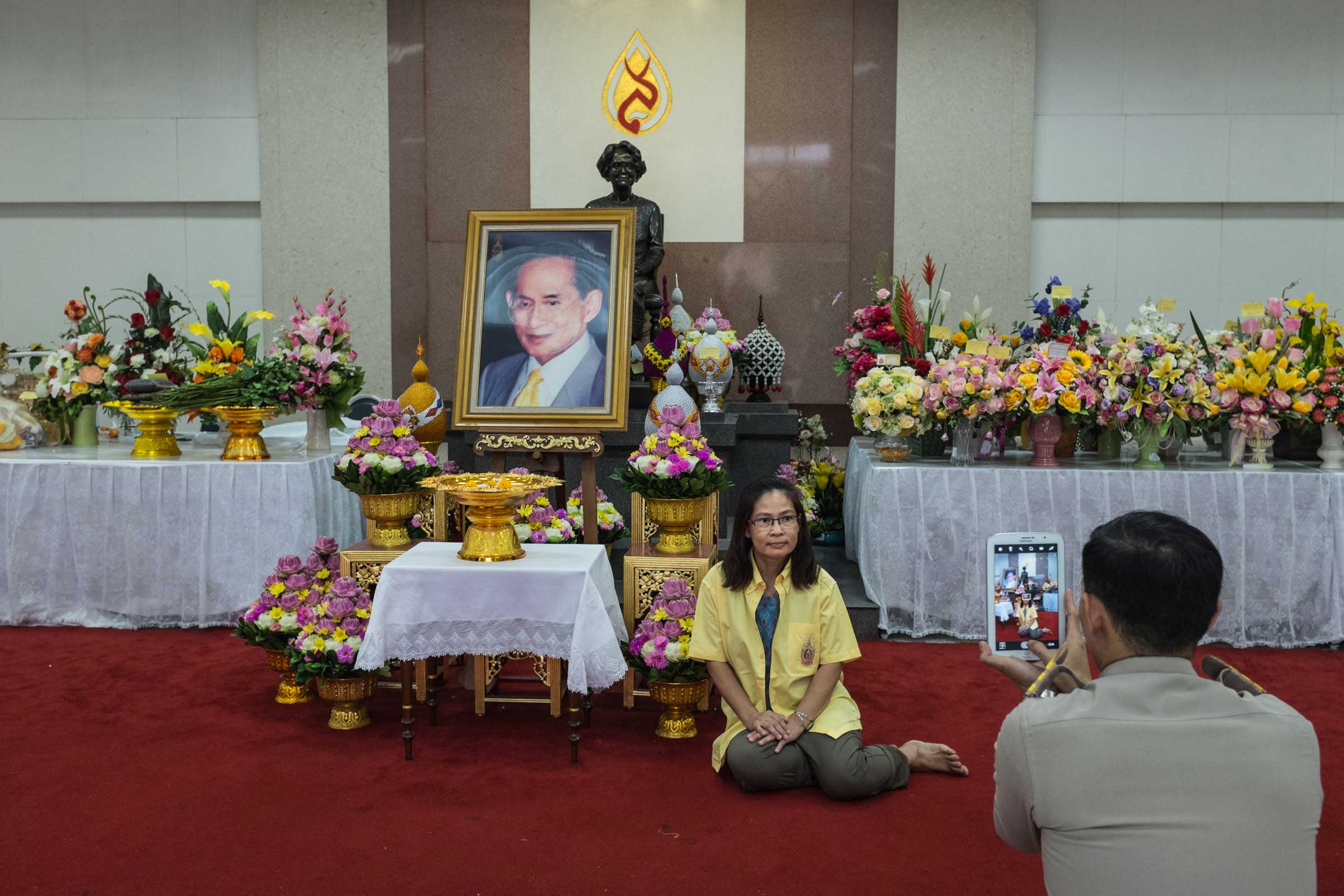
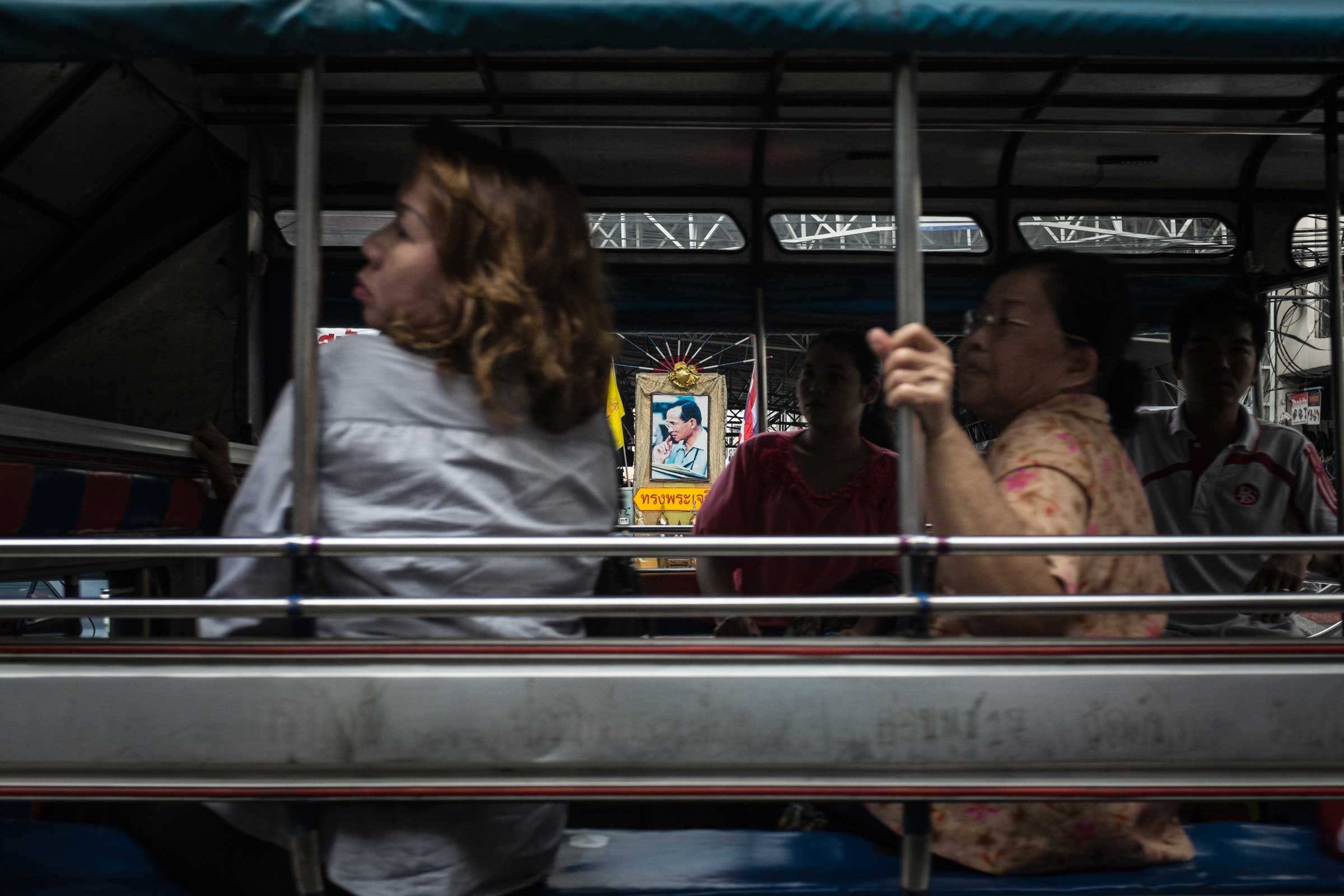
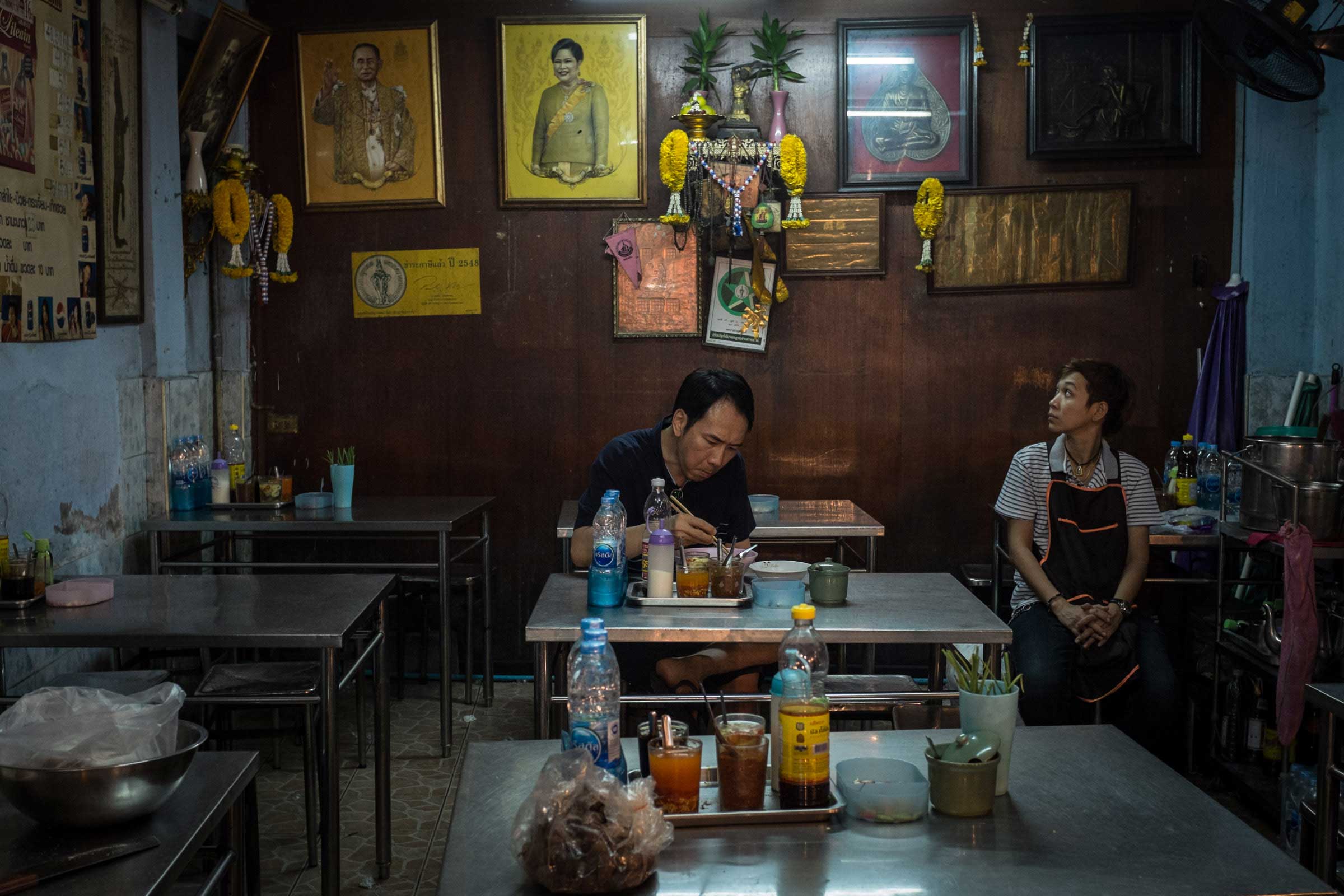
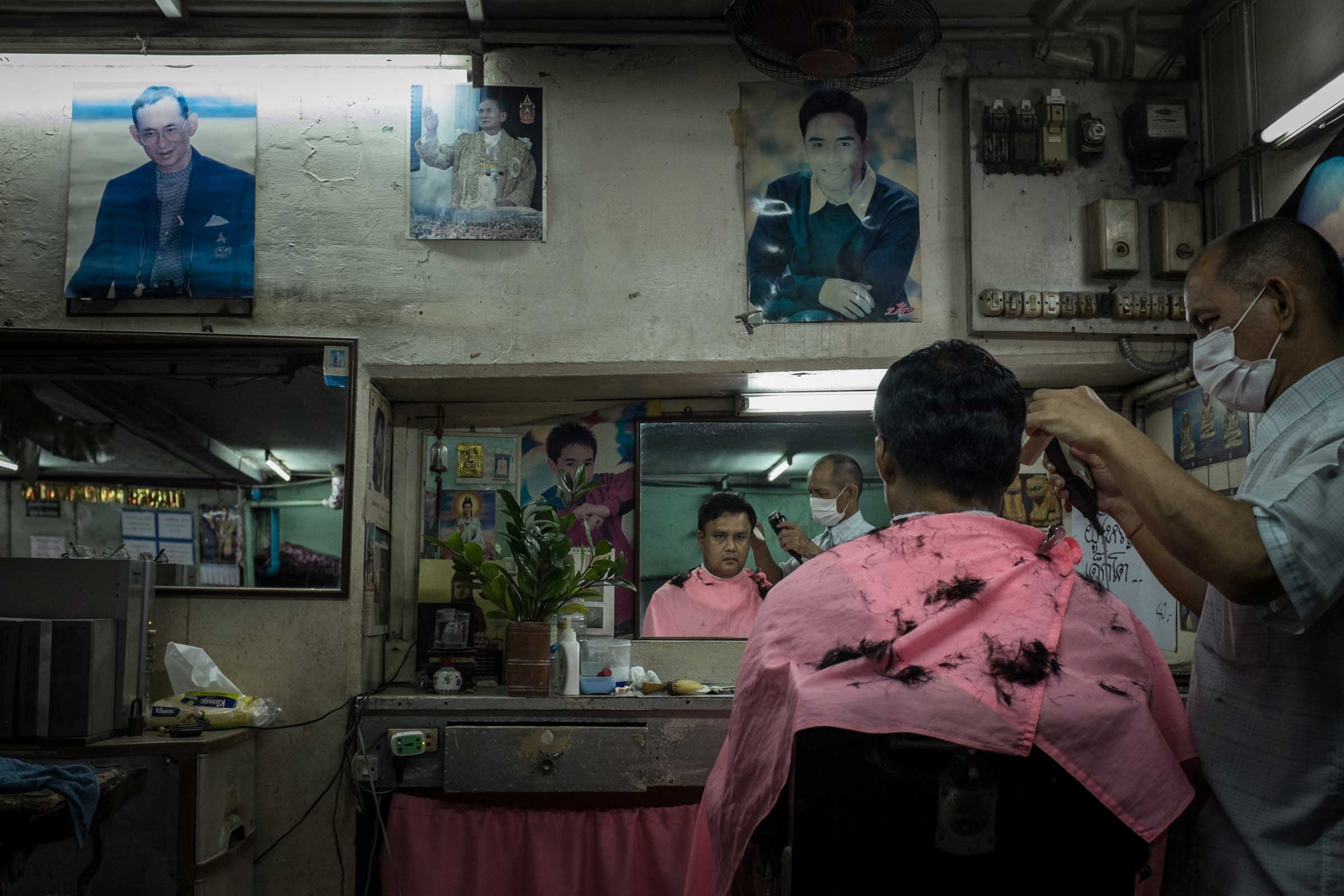
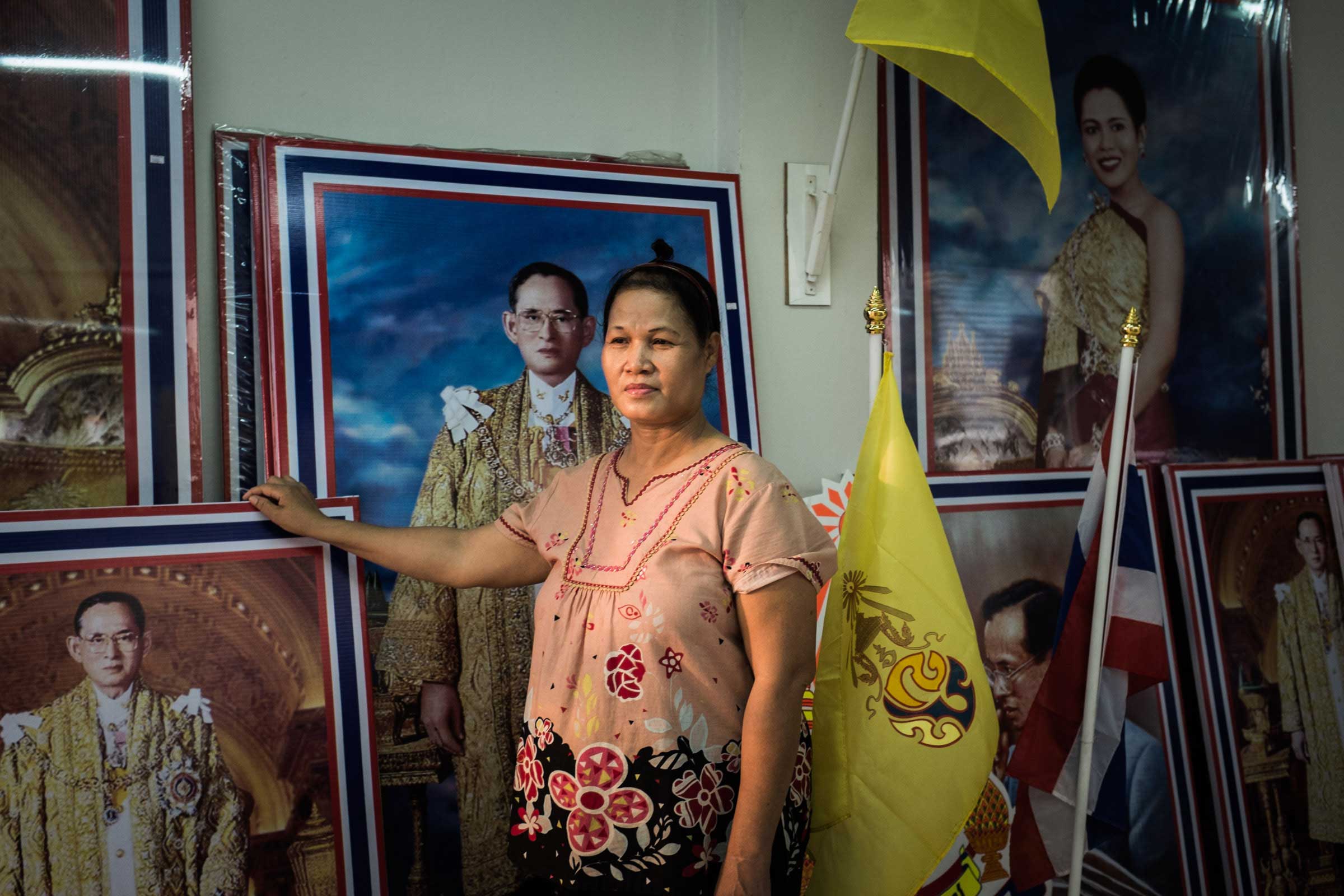
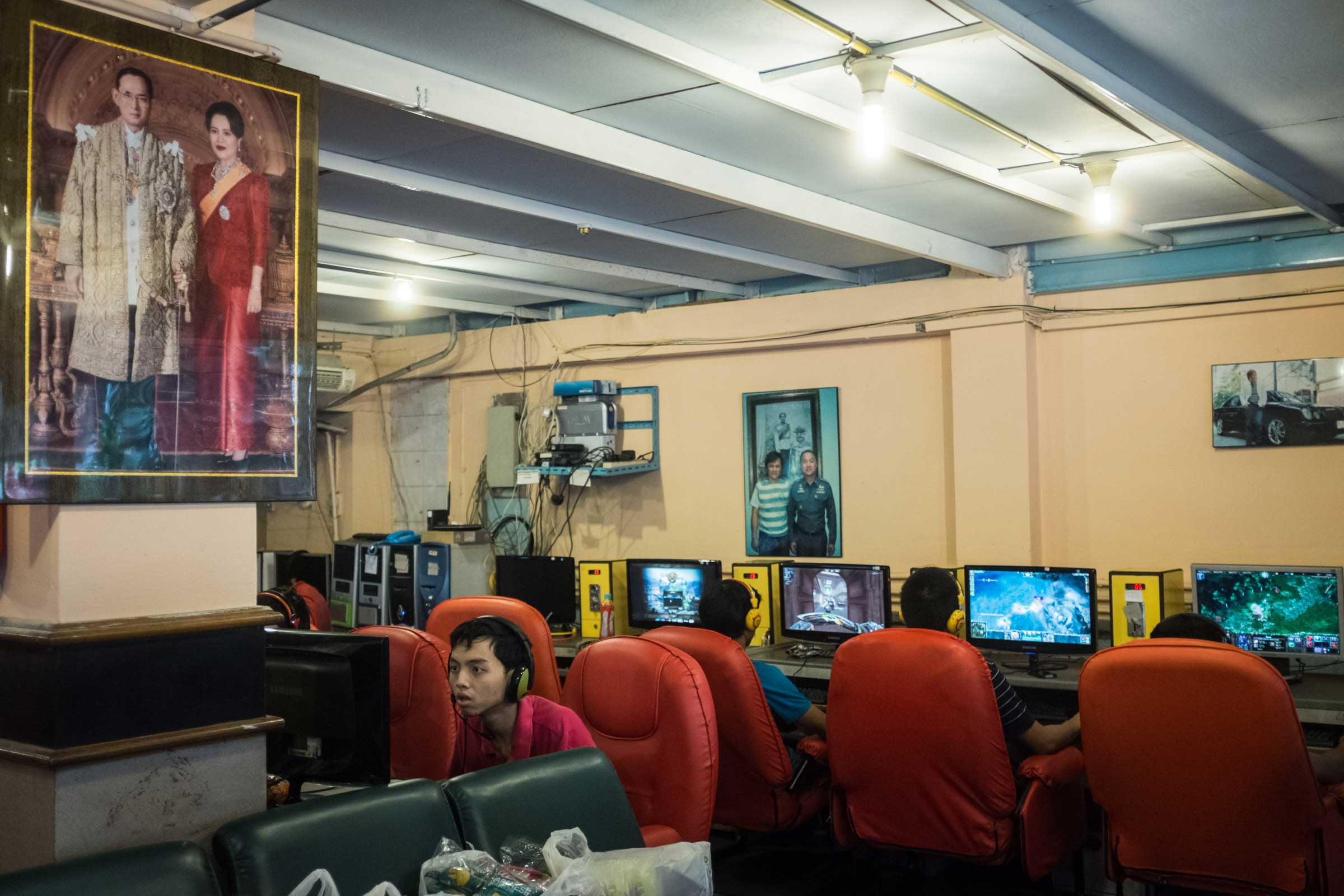
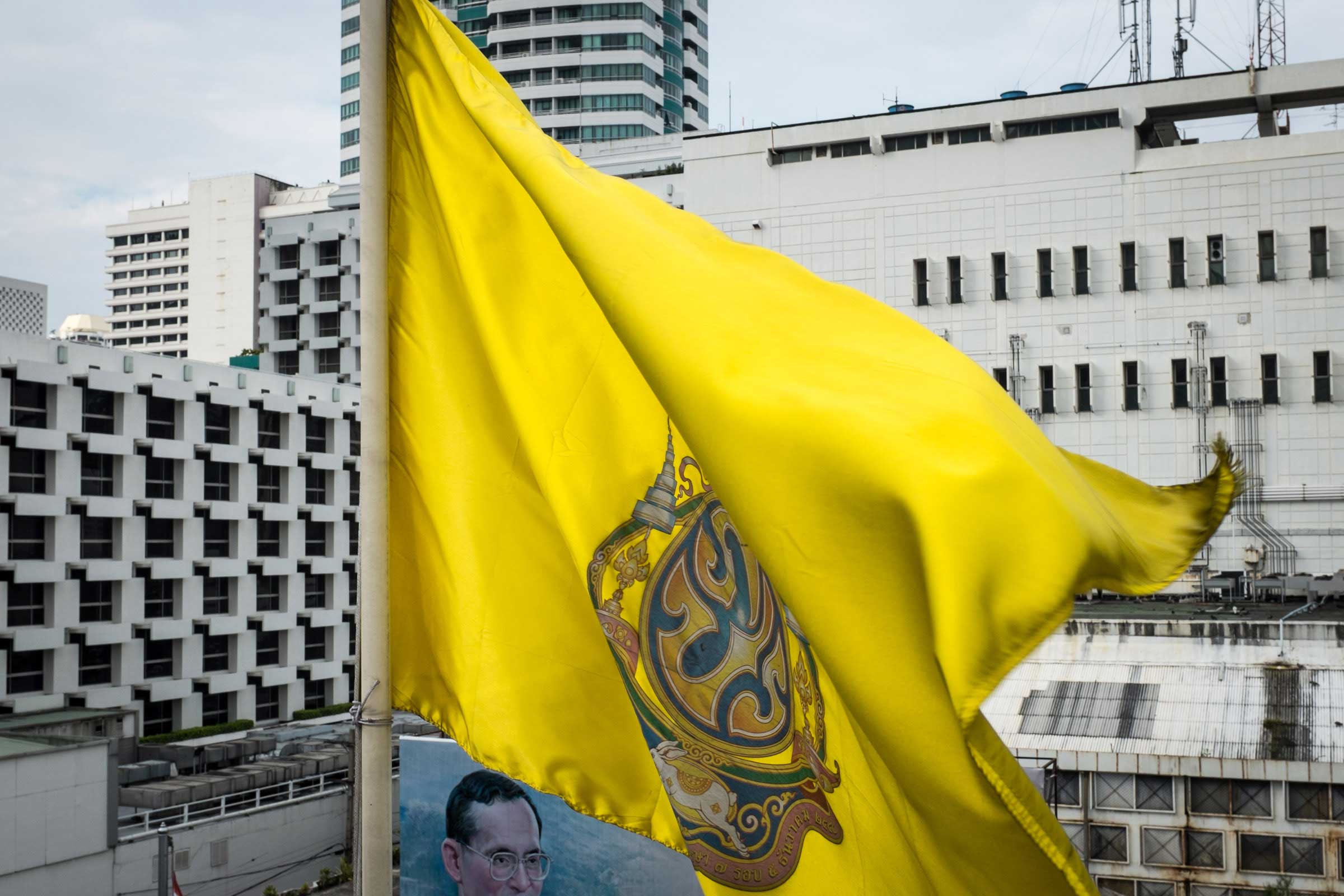
In early October of that year, demonstrations convulsed Bangkok in response to the arrest of prominent student activists. The crowd swelled to around 400,000, including many members of the public, owing to the military’s heavy-handed response that resulted in at least 100 civilian deaths. Bhumibol intervened, ordering the doors of Chitrlada Palace opened to provide the students refuge, and persuaded Thanom and his cohorts to go into temporary exile.
In September 1976, Bhumibol allowed Thanom to return to Thailand, even visiting him with Sirikit in Wat Bovornives — the Chakri dynasty’s personal temple — where he had ordained as a monk. Thousands of furious students gathered inside Thammasat University to oppose Thanom’s return. On Oct. 5, spurred on by radio broadcasts accusing the students of threatening the crown prince and communism, thousands of royalist paramilitaries massed outside the campus.
The killing began the following dawn. First, a rocket-propelled bomb was fired into the throng of students, reportedly killing four and injuring dozens. Military weapons wreaked a heavy toll until around 9 a.m., and at least two students were dragged out, tortured and lynched. Three others were seen dumped on tires, drenched in petrol and burned alive. A junta headed by the Defense Minister, Admiral Sa-ngad Chaloryu, seized power immediately after the massacre. Another flirtation with democracy had been crushed.
Away from politics, Bhumibol busied himself touring Thailand’s impoverished north, where a jumble of tribes lived in the Himalayan foothills straddling the arcane Golden Triangle. These communities traditionally farmed opium, and Bhumibol set about weaning them of growing poppies and suggesting alternatives, such as berries, vegetables and flowers, with varying success. “There are some things which are really positive beyond the media hype surrounding the monarchy,” says Keyes. “Tradition textile production in the north was fostered by the Queen and probably wouldn’t exist today without her support.”

The royal family was also becoming fabulously wealthy. Through the tax-exempt Crown Property Bureau (CPB), an opaque quasi-government agency responsible for managing royal business interests, valuable crown lands — some 16,400 acres (6,700 hectares), a fifth of which are prime holdings in central Bangkok — are leased out through 40,000 separate rental contracts. In addition, the CPB owned shares of companies such as Siam Cement, the dominant player for key construction materials, and Siam Commercial Bank, one of Thailand’s biggest banks.
These holdings are extremely profitable. According to the semiofficial 2011 biography King Bhumibol Adulyadej: A Life’s Work, crown income in 2010, during the throes of a significant economic slump, came to around $300 million. In 2011, despite the family being almost broke at Bhumibol’s coronation, Forbes estimated his personal wealth at $30 billion, making him the world’s richest monarch, beating the Sultan of Brunei into second place. Some analysts believe this figure could have doubled in the years since, though this is difficult to substantiate, as the CPB is not obliged to publish accounts publicly.
Bhumibol’s riches are fantastically out of step with the typical Thai citizen; GDP per capita stands at around $5,000, meaning Thailand’s King is some 5 million times wealthier than his average subject. No other nation in the top 10 richest royal families comes close to such disparity. (The next would be the Sultan of Oman, No. 10 on the royal rich list, whose subjects have a GDP per capita of $21,000.)
Bhumibol’s wealth has risen alongside his popularity, the latter owing much to the events of May 20, 1992. An extraordinary television broadcast showed Bhumibol, attired in a cream suit, admonishing two prostrate men. One was Suchinda Kraprayoon, the de facto leader of a military junta that had seized power the previous year; the other was Chamlong Srimuang, the blue pajama-clad leader of an ascetic Buddhist sect who had been leading street demonstrations. For three days soldiers had been firing on unarmed protesters, killing dozens and wounding hundreds, and the violence threatened to spiral further. Bhumibol’s fatherly intervention was beamed around the world and instantly halted the slaughter. “Western people ask me whether it is a paradox that I am King but support democracy,” he said. “I have to tell them that in Thailand the King is the guarantor of democracy.”
Royal supporters have ensured the clip is replayed on television and cinema screens until the present day. The overwhelming impression for the 50 million television viewers, and those blinking at the grainy images for two decades thereafter, was that their monarch had saved the nation from immediate disintegration. Four years later, when boxer Somluck Khamsing won Thailand’s first-ever Olympic gold medal at the Atlanta games, few were surprised when the boxer celebrated by holding aloft a portrait of the King rather than the national flag. To many Thais, Bhumibol was a bodhisattva, the last incarnation of the future Buddha.
Read More: Here’s What You Need to Know About Thailand’s New Constitution
This belief has roots in the Theravada Buddhist ideal of the Dhammaraja, the near-deific guarantor of justice and mediator of government and politics, who rules as monarch in accordance with dharma, or natural law according to the Buddha’s teachings. Bhumibol’s outwardly austere persona and strict adherence to religious ritual bolsters this perception. That the King is almost never seen smiling, a profound curiosity in the self-styled Land of Smiles, lends to his image as above worldly emotions in an almost ethereal way. Thai children are taught from birth as to the King’s godlike infallibility and his portrait still adorns all schools, institutions, businesses and practically every private household as the highest picture in the room. It is also propagated by television news, textbooks, government websites, official histories, newspapers and movies. The concept of King as grand patriarch is enshrined: in Thailand, Bhumibol’s birthday is Father’s Day; Queen Sirikit’s birthday is Mother’s Day. Thais can’t help but love their King.
Describing Bhumibol as a steadfast defender of democracy is problematic, though. Since the end of absolute monarchy in 1932, Thailand has had a fitful experience with popular representation, largely owing to its weak institutions of government. Every intervention has, at least ostensibly, received royal consent — “protection of the monarchy” is the stock justification — and, conversely, there have been several instances when the palace has thwarted a putsch. Thai historian Thak Chaloemtiarana famously dubbed the relationship between the military and monarchy “despotic paternalism.”
This historic narrative gained newfound credence following the election of a Sino-Thai businessman named Thaksin Shinawatra as Prime Minister in 2001. His government won massive support in rural areas, especially the populous, agrarian northeast, through programs to reduce poverty by improving infrastructure, providing microfinance loans and introducing 30 baht ($1) universal health care.
The Thai establishment baulked at Thaksin’s autocratic, CEO-style leadership and burgeoning cult of personality. Some even accused him of overshadowing the palace, and he reportedly irked Bhumibol personally by chumming up to Crown Prince Vajiralongkorn, showering the royal heir with expensive gifts, just as the King was attempting to rein in his son’s exorbitant lifestyle. To quote a confidential 2005 diplomatic cable from the American ambassador to Thailand published by WikiLeaks, Thaksin had “long ago invested in crown-prince futures.”
In 2006, a mass protest movement spurred by a political rival resulted in Thaksin being deposed by a coup d’état. The protesters were known as the Yellow Shirts, a hue they adopted in honor of Bhumibol, as that is his birthday color owing to having been born on a Monday. Thaksin remains in self-imposed exile following an in absentia conviction for abuse of power, but the political awakening he sparked has refused to die. Proxies have won every election since his toppling — most recently led by his sister, Yingluck Shinawatra, who was removed as Prime Minister in the May 2014 coup, which once again followed mass Yellow Shirt protests.
Thailand’s cleaving into color-coded rancor — Thaksin’s supporters, conversely known as Red Shirts, employ similar tactics of mass mobilization and civil disobedience — is the intractable challenge to Bhumibol’s legacy. “I used to wear a long yellow coat on Monday to honor the King,” confessed one taxi driver from the northeast, speaking to TIME during last year’s Bangkok Shutdown protests that catalyzed the latest coup. “But after Thaksin was forced out, I folded this away and stored it in a chest under my bed.”
Thailand’s erstwhile political leaders were notorious for their venality, and did very little for the nation’s rural poor, and so few felt aggrieved when they were deposed. (Certainly, Bhumibol was perceived as doing more good that the politicians ever did.) However, the King’s visibility faded along with his health since the mid-1990s, curtailed by back and heart problems. While Thaksin’s reforms were far from all positive, they drastically improved the lives of millions, who finally realized that a politician could make the difference, even if many suspected, as was historically characteristic of Thai leaders, he was feathering his own nest at the time. (Thaksin insists his conviction was politically motivated and strongly denies any impropriety.)

Thaksin’s policy of alleviating the plight of Thailand’s rural poor had echoes of Bhumibol’s earlier efforts. But, crucially, the societal structure of Thailand has radically shifted. When Bhumibol first ascended the throne, some 80% of Thailand’s 17 million people were uneducated rural peasantry, eking out substance livings from farms and forests, with life revolving around the local temple. By the new millennium, almost half of Thailand’s 60 million people had shifted to urban centers. Even those that remained in the northeast became “cosmopolitan villagers,” says Keyes, owning smartphones, surfing the Internet and milling around shiny new shopping malls boasting Starbucks and ice rinks.
Thaksin-backed governments have repeatedly been ousted, twice by the military and thrice by the courts. Given his frail health, it is unlikely the King was aware of the country’s recent political intrigues. Thailand’s royal-defamation laws restrict wide discussion of the King and his place in Thai society. Known as lèse majesté, or Article 112, they are considered the world’s harshest with penalties of up to 15 years in jail. Rather than being brought by a department of public prosecutions, like regular criminal charges, lèse majesté can be brought by any Thai citizen — no matter in what country they reside — at any time, against any other individual, Thai or foreign. They are often deployed as a political tool or to settle personal vendettas.
Cases of lèse majesté have flourished ostensibly against Bhumibol’s wishes. During his birthday speech in 2005, he said, “Actually, I must also be criticized. I am not afraid if the criticism concerns what I do wrong, because then I know. Because if you say the King cannot be criticized, it means that the King is not human. If the King can do no wrong, it is akin to looking down upon him because the King is not being treated as a human being. But the King can do wrong.”
Prosecutions have skyrocketed nonetheless. The U.N. notes at least 40 individuals have either been convicted or remain in pretrial detention for lèse majesté since last year’s coup. In August, Phongsak Sribunpeng, 48, was sentenced to 30 years in jail for six posts on Facebook, the harshest recorded punishment since 2006.
Bhumibol’s health problems may have precluded him from fighting this trend. Since 2009, he had been in and out of hospital for a variety of ailments, most recently for a chest infection and hydrocephalus (or water on the brain). In between admissions, he and Sirikit, who suffered a serious stroke in 2012, spent their time in the seaside resort of Hua Hin at Klaikangwon Palace, a name that translates as Far From Worries.
Bhumibol is now certainly that, though anxiety still wracks his erstwhile subjects. Fresh elections remain a distant prospect, human-rights abuses are rife and junta control is entrenched. A new constitution that allows for a nonelected Prime Minister and Upper House appointed by the military was controversially passed in a referendum in August. This is, however, a somewhat fitting end to a reign that has seen 15 attempted military coups, 10 of them successful — more than any other nation over the same period. One last superlative to rule them all.
More Must-Reads from TIME
- Donald Trump Is TIME's 2024 Person of the Year
- Why We Chose Trump as Person of the Year
- Is Intermittent Fasting Good or Bad for You?
- The 100 Must-Read Books of 2024
- The 20 Best Christmas TV Episodes
- Column: If Optimism Feels Ridiculous Now, Try Hope
- The Future of Climate Action Is Trade Policy
- Merle Bombardieri Is Helping People Make the Baby Decision
Write to Charlie Campbell at charlie.campbell@time.com